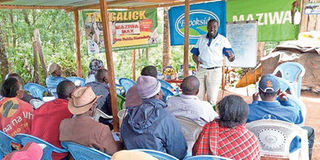Dairy demo farms pay off for farmers, Brookside

Farmers go through dairy lessons in Mr Paul Mwai’s farm in Gituamba, Gatundu North in Kiambu County. Brookside usually hires various dairy specialists to train the farmers. PHOTO | MARY WAMBUI | NMG
What you need to know:
- With seven high quality cows, all of which are lactating, Mwai’s farm has been attracting visitors from Kiambu and beyond. On average, the 33-year-old farmer milks 200 litres daily, which he sells to Brookside.
- With the assistance of extension service personnel seconded to him by the Ruiru-based processor, Mwai’s daily milk production grew from just 30 litres in 2015 to the current peak of 200 litres.
- Due to his enthusiasm in dairy farming, Brookside Dairy agreed to support him set up a demo farm where local farmers could visit for knowledge and skills transfer.
- Brookside usually hires various dairy specialists to train the farmers. The company, which pioneered the use of dairy demonstration farms in the country, partners with 160,000 farmers drawn from 27 counties.
The sky is bright and the weather warm as tens of dairy farmers troop to Paul Mwai’s farm in Gituamba, Gatundu North in Kiambu County.
Armed with notebooks and pens, the farmers on this Friday are eager to pick as many dairy farming tips as possible to better their enterprises.
The farm, named Gituamba, is one of 25 others set up across the country by milk processor Brookside Dairy, as part of efforts to transform dairy into a viable commercial enterprise for smallholder farmers.
With seven high quality cows, all of which are lactating, Mwai’s farm has been attracting visitors from Kiambu and beyond. On average, the 33-year-old farmer milks 200 litres daily, which he sells to Brookside.
“I have set my eyes on doubling my current production since Brookside offers a guaranteed market for the milk,” Mwai says.
With the assistance of extension service personnel seconded to him by the Ruiru-based processor, Mwai’s daily milk production grew from just 30 litres in 2015 to the current peak of 200 litres.
One of his obvious strengths that draws farmers in droves to the model farm is his massive investment in animal feed conservation. Mwai, who now employs three workers, has planted half-an-acre of fodder crops namely napier, sweet potato and maize, which he harvests and prepares silage. Farmers often visit to observe his demonstrations on silage preparation.
“Silage has helped me maintain optimum milk production even in periods of depressed rainfall. I have been attending dairy training courses organised by Brookside in Gatundu North, and that is where I learnt skills in feed preparation,” Mwai says.
Due to his enthusiasm in dairy farming, Brookside Dairy agreed to support him set up a demo farm where local farmers could visit for knowledge and skills transfer.
COMMITED TO HELPING FARMERS
Brookside’s milk procurement and manufacturing director John Gethi says demonstration farms are important for peer-to-peer training of milk producers at the grass roots.
“Majority of our raw milk suppliers are smallholder farmers. We felt it was prudent to support farms such as Mwai’s, where surrounding farmers could visit for training in dairy husbandry,” Gethi says.
He adds the processor has set up 25 demonstration farms in key raw milk sheds across the country.
“It is not enough to ask farmers to grow milk production without enlightening them, from a practical perspective, on the various practices that would enable them increase production for each cow kept,” Gethi says.
He notes that Brookside Dairy is committed to helping farmers reduce the cost of production along the milk value chain, adding that those attending trainings on the demo farms are taken through various ways of minimising and eventually eliminating losses during the handling of raw milk.
Apart from feed conservation, farmers are also trained on clean milk production, planning and budgeting, record-keeping, breed improvement and animal disease identification and management,
Mwai’s farm also offers a good example on cost reduction, which is purely dependent on increasing milk volumes produced by each cow.
“Since milk is a volume-based enterprise, I found out that the best way to break even is by increasing production. Prices paid by processors are usually impacted by market dynamics, but as long as I keep my volumes high, across all seasons, I am assured of better income,” Mwai says.
He commends Brookside for paying promptly for milk delivered, something that has helped him maintain a healthy cash flow.
Brookside usually hires various dairy specialists to train the farmers. The company, which pioneered the use of dairy demonstration farms in the country, partners with 160,000 farmers drawn from 27 counties.





